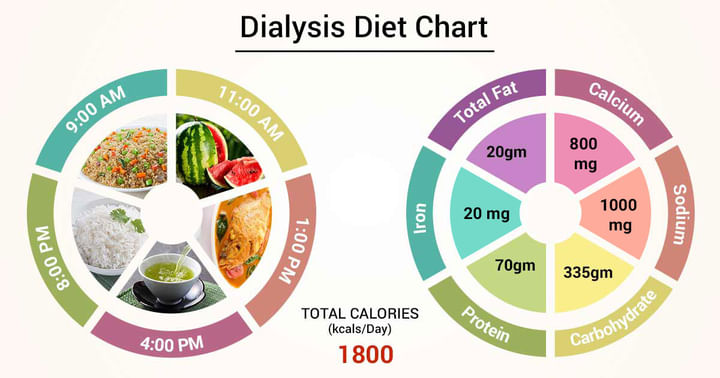Diet Chart For dialysis
Last Updated: Jan 20, 2025
About
Dialysis is the clinical purification of blood by dialysis, as a substitute of normal functioning of the kidney. They are responsible for purifying the blood by removing waste and excess fluid from the body. When the kidneys don’t work properly, dialysis is used to perform the function of the kidneys. The process is also known as renal replacement therapy. As the kidneys are incapable of doing their task, a dialysis machine replaces the work of kidneys. It is, therefore, necessary to inculcate a healthy dialysis diet that keeps the body rich of nutrients and energy.
Following are the four main things all dialysis patients need to be careful about in their diet:
- Potassium: Fruits generally contain high Potassium levels. Many vegetables also contain high potassium. Vegetables can be leached to remove a lot of the potassium by placing it in water a day before consumption.
- Sodium: People with kidney disease should, therefore, restrict the amount of sodium in their food. Common salt used in the food is a major source of Sodium in the food. Gradually reduce the amount of salt in your food. Slowly you will find it difficult to eat food with normal salt.
- Phosphorus: Foods high in Phosphorus include milk, paneer, tofu, cheese, curd, chicken, eggs, fish, cola drinks, chocolate, nuts, soya foods, oats, ready to eat foods. Foods low in Phosphorus fresh foods, fresh vegetables, white bread.
- Fluids: Never gulp down fluid, sip it. Drink fluids other than water. Reduce the amount of salt as more salt implies more thirst.
Diet Chart
| Sunday | |
| Breakfast (8:00-8:30AM) | 1 cup broken wheat upma with vegetables+1 cup toned milk/1 cup tea (100ml) |
| Mid-Meal (11:00-11:30AM) | 1 small wedge(100gm) watermelon |
| Lunch (2:00-2:30PM) | 1 cup rice+2 chapathi+fish-tuna (100gm) curry+cabbage and green peas sabji |
| Evening (4:00-4:30PM) | 1/2 cup Sweet potato salad+ 1 cup green tea(100ml) |
| Dinner (8:00-8:30PM) | 1 cup rice+1/2 cup bitter gourd(karela) curry+1/2 cup vegetable salad cup rice |
| Monday | |
| Breakfast (8:00-8:30AM) | 1 cup roasted oats upma with vegetables+1 cup toned milk/1 cup tea (100ml) |
| Mid-Meal (11:00-11:30AM) | Musk melon (100gm) |
| Lunch (2:00-2:30PM) | 1 cup rice+2 chapathi+aloo brinjal sabji+1/2 cup tomato dal+1 glass buttermilk |
| Evening (4:00-4:30PM) | Avocado(50gm) whole wheat bread(3 slices) sandwich+ 1 cup green tea(100ml) |
| Dinner (8:00-8:30PM) | 3 chapathi(multigrain-wheat;jowar;bajra)+lauki sabji+1/2 cup vegetable salad |
| Tuesday | |
| Breakfast (8:00-8:30AM) | 3 dosa+1/2 cup sambhar+1tsp methi chutney+1 cup toned milk/1 cup tea (100ml) |
| Mid-Meal (11:00-11:30AM) | 4 Jambu fruits/ strawberries(small) |
| Lunch (2:00-2:30PM) | 4 chapathi+1/2 cup lauki dal+1/2 cup green peas and panner sabji+1 glass butter milk |
| Evening (4:00-4:30PM) | 1 cup boiled green gram sprouts with lemon+ 1 cup green tea(100ml) |
| Dinner (8:00-8:30PM) | 3 chapathi+ 1/2 cup bhindi sabji+ 1 cup vegetable salad |
| Wednesday | |
| Breakfast (8:00-8:30AM) | 1/2 cup Oats in 1 glass toned milk (200ml) |
| Mid-Meal (11:00-11:30AM) | papaya (100gm) |
| Lunch (2:00-2:30PM) | 1 cup rice+2 chapathi+1/2 cup yam (jimikand) curry+1/2 cup ivy gourd(parmal) sabji+1 glass buttermilk |
| Evening (4:00-4:30PM) | 1 bowl unsalted pop corn+1 cup tea/milk(toned) |
| Dinner (8:00-8:30PM) | 1 cup rice+1/2 cup Snake gourd curry+1/2 cup vegetable salad cup rice |
| Thursday | |
| Breakfast (8:00-8:30AM) | 4 Idly+ 1/2 cup sambhar+1 tsp coconut chutney+1 cup milk/ 1 cup tea (100ml) |
| Mid-Meal (11:00-11:30AM) | 1 medium size guava |
| Lunch (2:00-2:30PM) | 1 cup rice+2 chapathi+1 portion(100gm) grilled/stewed-tuna fish+1/2 cup rajmah curry |
| Evening (4:00-4:30PM) | 3 Cracker biscuits+ 1 cup tea/milk(toned)(100ml) |
| Dinner (8:00-8:30PM) | 3 chapathi+ 1/2 cup ridge gourd(thori) sabji+1/2 cup vegetable salad |
| Friday | |
| Breakfast (8:00-8:30AM) | 2 paratha(aloo/onion) with 2 tsp groundnut chutney+1 cup toned milk/1 cup tea (100ml) |
| Mid-Meal (11:00-11:30AM) | Pineapple (100gm) |
| Lunch (2:00-2:30PM) | 4 chapathi+1/2 cup cluster beans curry+1/2 cup capsicum paneer sabji+ 1 glass buttermilk |
| Evening (4:00-4:30PM) | 1 small fistful (40 gm) of peanuts,almonds,walnuts+1 cup green tea(100ml) |
| Dinner (8:00-8:30PM) | 1 cup rice+1/2 cup raw banana sabji+1/2 cup vegetable salad |
| Saturday | |
| Breakfast (8:00-8:30AM) | Vegetable sandwich with 4 whole wheat bread slices+cucumber,tomato, onion,lettuce+1 cup toned milk/1 cup tea (100ml) |
| Mid-Meal (11:00-11:30AM) | 1 medium size apple |
| Lunch (2:00-2:30PM) | 4 chapathi+1/2 cup french beans curry+1/2 cup colocasia(arbi) sabji+ 1 glass buttermilk |
| Evening (4:00-4:30PM) | 1 cup boiled bengalgram with lemon+ 1 cup green tea(100ml) |
| Dinner (8:00-8:30PM) | 3 chapathi(multigrain-wheat;jowar;bajra)+1/2 cup tinda sabji+ 1/2 cup vegetable salad |
Food Items To Limit
- Processed Food- most of the processed foods contain sodium, Mono sodium glutamate, simple sugars for preservative purposes. They also contain potassium in high quantities. As these foods cause further damage to kidneys they have to be avoided.
- Fast Food- These foods include pizza, burger etc., where they have high amounts of saturated and trans fat which harms the kidneys. These also contain MSG, high amounts of sodium and potassium which ahve to be avoided too. Protein- Foods high in protein should be avoided before the dialysis schedule.
- Milk: Whole milk and milk products have to be avoided as they are rich sources of potassium. Fruits: Fruits such as banana, avocado, musk melon, strawberries has to be avoided as they are rich in potassium whose excess consumption is harmful to kidney heath in CKD.
- Nuts, Seeds, Beans- They have to be avoided as the dried form of these foods has high levels of potassium.
- Soft Drinks- carbonated beverages have to be avoided as they have high levels of phosphoric acid which can harm the kidneys in CKD.
- Organ meats- Organ meats like liver, heart, kidney are rich sources of potassium and these have to be avoided.
- Liquid intake- Over consumption of liquids has to be avoided as that might lead to high blood pressure. general liquid intake is 1000ml/day.
Do's And Dont's
Do's:
- Include sufficient protein in the diet after dialysis.
- Eat Right
- Opt for Leaching of Vegetables which are high in potassium.
- Eat Fruits like Apple, Guava, Pear, pineapple and papaya.
- Eat all gourd vegetables, tinda, capsicum, Cabbage, Cauliflower, Onion
- Include foods rich in calcium such as milk, leached green leafy vegetables.
Don'ts:
- Avoid water drinking water in large quantities at once, instead take sips.
- Avoid high salty foods which might increase blood sodium levels.
- Avoid fatty, smoked foods and frozen foods that contain preservatives.
- Don't consume sugery foods/ beverages and alcoholic drinks too.
- Avoid smoking.
Food Items You Can Easily Consume
- Cereal: wheat, white rice, white bread and pasta.
- Pulses: red gram, green gram, black gram, bengal gram (all leached) and beans like broad, cluster, french.
- Vegetables: all gourds- snake gourd, ridge gourd, bottle gourd, ivy gourd, ladies finger, tinda,green leafy vegetables Fruits: Apple, guava, pear, papaya, cranberries, blueberries, raspberries, red grapes
- Nuts & seeds: almonds, walnuts (2-3) (leached pieces)
- Milk and milk products: low fat milk, low fat curd, low fat paneer.
- Meat,fish & egg: Skin out chicken, egg white, fishes like salmon, sardines, trout, mackerel, tuna.
- Oil: 2 tsp (10ml)
- Sugar: 2 tsp (10gm)
References
- Bolasco P, Cupisti A, Locatelli F, Caria S, Kalantar-Zadeh K. Dietary management of incremental transition to dialysis therapy: once-weekly hemodialysis combined with low-protein diet. Journal of Renal Nutrition. 2016 Nov 1;26(6):352-9. [Cited 30 June 2019]. Available from:
- Eating & Nutrition for Hemodialysis- NIH, National Institute of Diabetes and Digestive and Kidney Diseases [Internet]. niddk.nih.gov 2016 [Cited 06 August 2019]. Available from:
- Kanno Y. Diet therapy in patients receiving peritoneal dialysis. InNutrition and Kidney Disease: A New Era 2007 (Vol. 155, pp. 72-81). Karger Publishers. [Cited 30 June 2019]. Available from:
Table of content
Find Dietitian/Nutritionist near me
Ask a free question
Get FREE multiple opinions from Doctors



